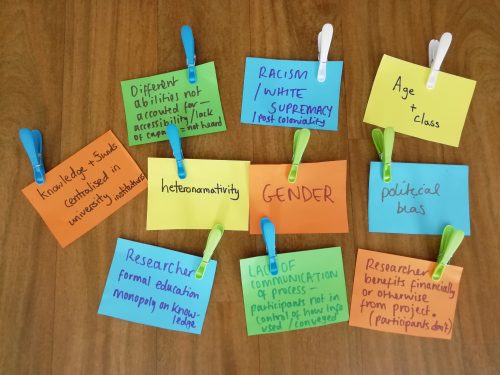“What on earth is ‘community researcher’ training?”
So asked a friend of mine recently when I had to cancel an arrangement with her to attend a Saturday training session at Switchboard in Brighton, a helpline charity which I used to volunteer for. I wasn’t sure how to answer my friend’s question at the time, but I just knew from the brief description of the event I had been given it was for me. And I was right.
Community researching is a new initiative from Switchboard which aims to train those interested with the skills required to conduct interviews and focus groups with local people about issues which concern them.
But it’s more than that. Community research does what it says on the tin. It’s all about individuals doing authentic research into their own communities, not an academic who’s been parachuted in from outside with half an eye on furthering their career by getting a piece published in a more prestigious journal. It has a very empowering message; ‘nothing about us without us’.
Why is this so important? In the postscript to my blog post last Sunday I looked at Bristol Bisons rugby club and their criticism of the fact that the Home Office has incorporated the colours of the rainbow flag into their logo to mark Pride month, whilst at the same time refusing asylum to Ken Macharia, one of their gay players, insisting he is safe to return to his native Kenya despite the fact ‘homosexual acts’ are illegal there.
Where I live in London I am surrounded by many corporate claims to inclusivity at the moment. Lots of companies are decking out their stalls with rainbows and specific references to their ‘pride’ in supporting LGBTQ+ communities. Perhaps many of these claims are valid, but they are all certainly done in the knowledge that they are now good for business. I doubt they would have been given such prominence in shop windows 30, 20 or even 10 years ago. We have to constantly question why such claims are being made, and whether they actually add up.
Community research doesn’t have to make such claims; it is by its nature bottom-up, genuine and authentic.
The initiative itself has been inspired by the popular education movement, a translation from the Spanish ‘educación popular’ or the Portuguese ‘educação popular’. In this case ‘popular’ refers not to a well-liked film or song but the ‘popular classes’ (working/lower middle class). One of its foremost thinkers was Brazilian Paulo Freire, very much part of the strong Latin American tradition for popular education established by a series of left-wing governments in South America during the 20th century.
What distinguishes popular education from other types of alternate learning is that; ‘…in the context of social injustice, education can never be politically neutral: if it does not side with the poorest and marginalised sectors- the ‘oppressed’ – in an attempt to transform society, then it necessarily sides with the ‘oppressors’ in maintaining the existing structures of oppression, even if by default.’ (Liam Kane).
To this end, it rejects the notion of education as ‘transmission’, where students are seen as passive empty vessels, waiting with pen and paper in hand to be filled with the superior and morally unquestionable teachings of the voices of authority in the classroom and wider society.
It is a genuine grassroots movement focused on placing value on learning from everyone’s experiences, not just wealthy white Etonians, with its end goal being the total transformation of our communities to make life better for the people who actually live in them.

By democratising access to the skills set needed to conduct research, usually locked away in universities and accessible only at a high price, individuals and groups are afforded the opportunity to better their own lives, a concept very much at the heart of Switchboard’s approach. One study recently launched by them is looking into the experiences of LGBTQ+ people with cancer, an until now neglected group. LGBTQ+ people with cancer who live and/or work in the area will conduct the research, and report back on the needs of their own communities. Switchboard will then work with local authorities to see what changes need to be made.
This is the beauty of the community research initiative and the popular education movement; both are genuinely open and inclusive. Anyone is encouraged to reflect on what is important to them and act on it by doing their own research, the results of which can be shared in a variety of accessible ways. After all, a formalised report always comes with a layer of exclusive and excluding jargon, impenetrable for many. A blog, vlog or podcast is an equally valid way of sharing findings. Or perhaps something else. Whatever’s best for the individual concerned.
It’s an empowering message that has inspired me, and I hope it will inspire you too.
Words by Matt, a volunteer community researcher for Switchboard, originally published on BreakingMuse.
To find out more about Switchboard’s community researchers, click here. If you are interested in becoming a volunteer for Switchboard please contact [email protected].
